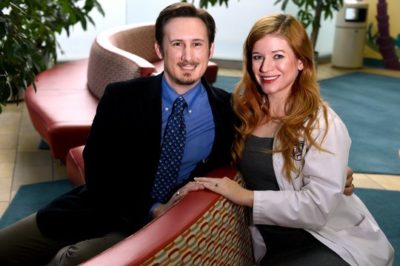For the 2017 essay contest, The Lasker Foundation asked how we could make biomedical research part of the daily global dialogue. More than 300 students from around the world responded, presenting creative ideas for bringing science into everyday conversations. In the end, the judges awarded first place to Abigail Cline, a medical student at the Medical College of Georgia, for her essay describing how entertainment could shift research “from the benchtop to the big screen.”

Abigail Cline and her husband, Hunter Appler, shortly after returning from the Lasker Awards Luncheon in 2017.
At the time of her win, Cline was no stranger to the essay contest; she had entered every year since 2014. But the 2017 topic was especially interesting to her because of her experiences as a biochemistry graduate student at the University of Georgia prior to pursuing medical school. “I was equally impressed by the promising biotechnology my peers were exploring and by the disinterest with which it was met by many non-scientists,” she recalled. “I knew that they would find it just as fascinating as I did if only it were cast in the proper light.”
Cline strongly believes that entertainment—cinema in particular—is the best medium for carrying scientific conversations into the everyday lives of the community. “I find myself drawn to science fiction because it facilitates discussions about how society would use fantastic technologies and the ethical questions surrounding them,” she said.
Referencing films such as The Day After Tomorrow (2004) and Jurassic Park (1990) in her essay, Cline highlighted how cinema galvanized audiences, increasing public interest in climate change, cloning, and chaos theory. She argued that exposing artists to research would foster creative awareness and enthusiasm for research, leading to a call for more bioscience entertainment on our screens. One way researchers might facilitate this goal, Cline suggested, is for the NIH to sponsor a number of artists-in-residence each year. With firsthand experience in a research environment, these artists could then go on to accurately present scientific discoveries in engaging and entertaining ways.
Another option, of course, is for scientists to build up their own creative and artistic skills to present science. Cline herself has dabbled in creative writing and is interested in writing a science fiction screen play someday. She is now completing a dermatology research fellowship at Wake Forest University and applying for residency this fall.
As for her cinematic career, “It’s a rare day that I don’t arrive home and tell my husband ‘I had a movie idea today,’” Cline said. “I’m sure that writing a screenplay will be challenging, but I’m ready for a challenge.”
